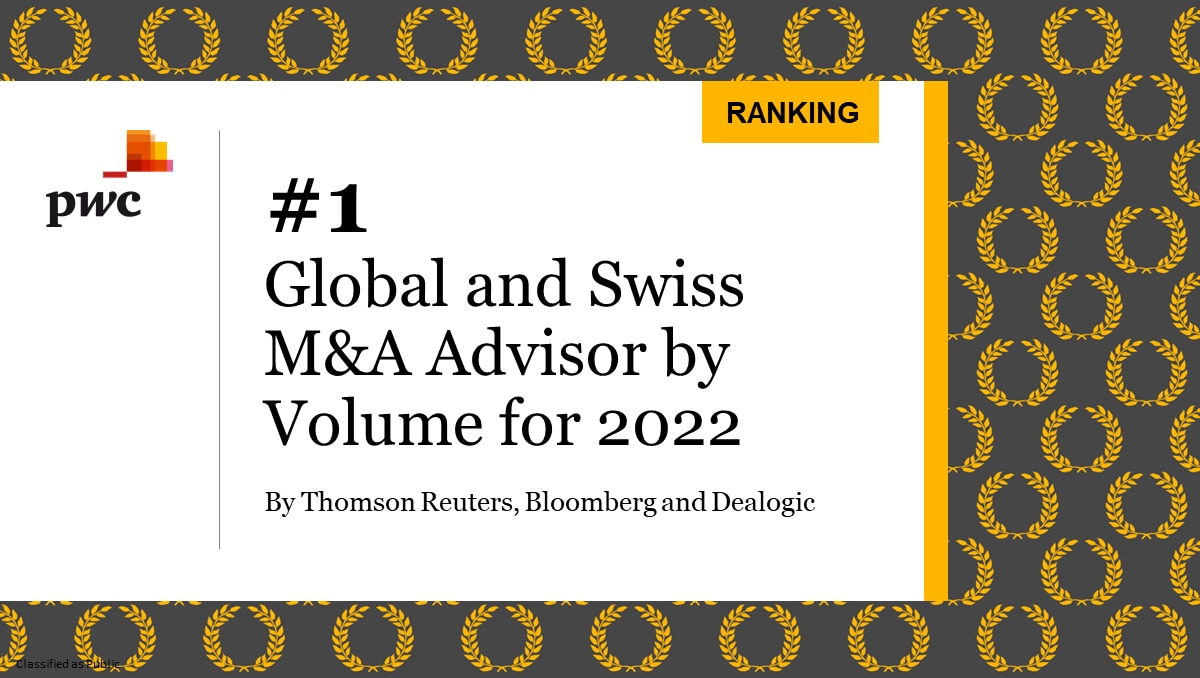At the same time, the current challenging conditions create rare opportunities, thanks to a reset in valuations, lessened competition for deals, and new assets coming to market – also from distressed situations. We should remember that deals made shortly after the financial crisis of 2007/08 were difficult to realise too, and the wisdom of those deals was also questioned at that time. But in hindsight, many of those transactions proved to be very successful. Therefore, it does not come as a surprise that some market participants have already begun to take advantage of today’s opportunities and to lay the ground for overtaking their competitors.
This matches with the findings of PwC’s 26th Annual Global CEO Survey: 72% of corporate leaders are pessimistic about global economic growth, but 61% told us that they do not plan to delay deals in 2023 to alleviate potential economic challenges and volatility. Technology has been the most active sector for dealmaking over the past several years, and M&As help accelerate the digital transformation of businesses. Beyond expanding tech capabilities, companies are seeking to reposition themselves against competitors in a rapidly changing market, replenish their pipelines, align themselves with new markets, and generally reinvent themselves. Therefore, targets with innovative business models and interesting technology, digital assets, or other capabilities can be acquired at a more reasonable valuation than before.
M&A volumes and values are back at pre-pandemic levels
After the record 2021 levels, global M&A volumes and values declined in 2022 by 17% and 37%, respectively, but remained above 2020 and healthy pre-pandemic levels (see graph). The high levels of 2021 M&A activity persisted until early 2022, but as headwinds became stiffer, each successive quarter saw a decline in deal activity from the previous one. In the second half of 2022, deal volumes and values declined by 25% and 51%, respectively, compared to the same period in 2021. However, the trends were not consistent across countries and regions.
M&A in EMEA, for instance, performed better than in the Asia Pacific and Americas regions, despite higher energy costs and lower investor confidence impacting the markets. Between 2021 and 2022, deal volumes and values across EMEA declined by 12% and 37%, respectively. In the Americas, the decline was even higher with 17% and 40%, due to a combination of macroeconomic, regulatory, and geopolitical factors. Deal values were particularly hard-hit and the number of US megadeals (with a value of more than USD 5 billion) almost halved, from 81 in 2021 to 42 in 2022. China, however, reported the largest decline in M&A activity, with deal volumes and values decreasing by 46% and 60%, and companies seeking access to Asian markets being increasingly looking beyond China.
Deal volumes and values, 2018-2022
“This downturn provides opportunities. More reasonable valuations combined with lower deal competition may be the basis to realise your M&A strategy.”
Key topics for business leaders and dealmakers
With the growing investor scrutiny, dealmakers need to find ways to convince boards, investment committees, and other stakeholders of new investment opportunities:
Speak about transformation.
Consider how your stakeholders will perceive the deal – will it bring new offerings, new markets, new customers, accelerate digitalisation, increase pressure on competitors or improve the long-term positioning of the company? By deepening the narrative and highlighting game-changing strategic attributes you will convince also cautious stakeholders.
Get creative with your financing.
Borrowing is more expensive and harder to secure, but sophisticated investors will find creative ways to get deals done. Especially private equity (PE) funds are known for being innovators and recently, they have financed important deals with a combination of different financing structures such as term loans, seller notes, all-equity funding, consortium deals, or minority investments.
Review your strategy and optimise your portfolio.
In uncertain times, companies need to show capital discipline and review their business strategy. When reassessing their portfolio against their core strategy, CEOs must ask themselves to which extent they continue to invest in non-core or lower-growth areas.
Prioritise your workforce strategy.
Several PwC studies identify the workforce as the number one risk to growth since it has a direct impact on business performance. Therefore, today’s deals must all have a well-thought-out people strategy. How to recruit, motivate and retain staff and what impact employee compensation and benefits will have on the future cost structure – especially given talent shortages and wage inflation pressures – are important questions of due diligence and need careful consideration.
What’s the 2023 outlook for mergers and acquisitions in Switzerland?
Investors are still digesting the steep decline in stock market valuations in 2022, and financial market volatility, inflationary pressures, rising interest rates, supply chain disruptions, and geopolitical tensions continue to make the economic outlook for 2023 look bleak. However, in the coming months, M&A will be a strategic tool to create value and deliver sustainable results – with more deals likely in the second half of the year.
In Switzerland, M&A activity remains at a high level, mainly due to the strong environment in the mid-market segment. Large transactions are becoming more difficult due to debt financing challenges related to inflation developments. Companies need to act with creativity, agility and intelligence to overcome the current challenges and bring stakeholders on board.
#social#

PwC ranked #1 Global and Swiss M&A Advisor by Volume for 2022
Our PwC Corporate Finance team has ranked as the Global and Swiss #1 M&A Advisor by Volume for 2022 by Thomson Reuters, Bloomberg and Dealogic.







